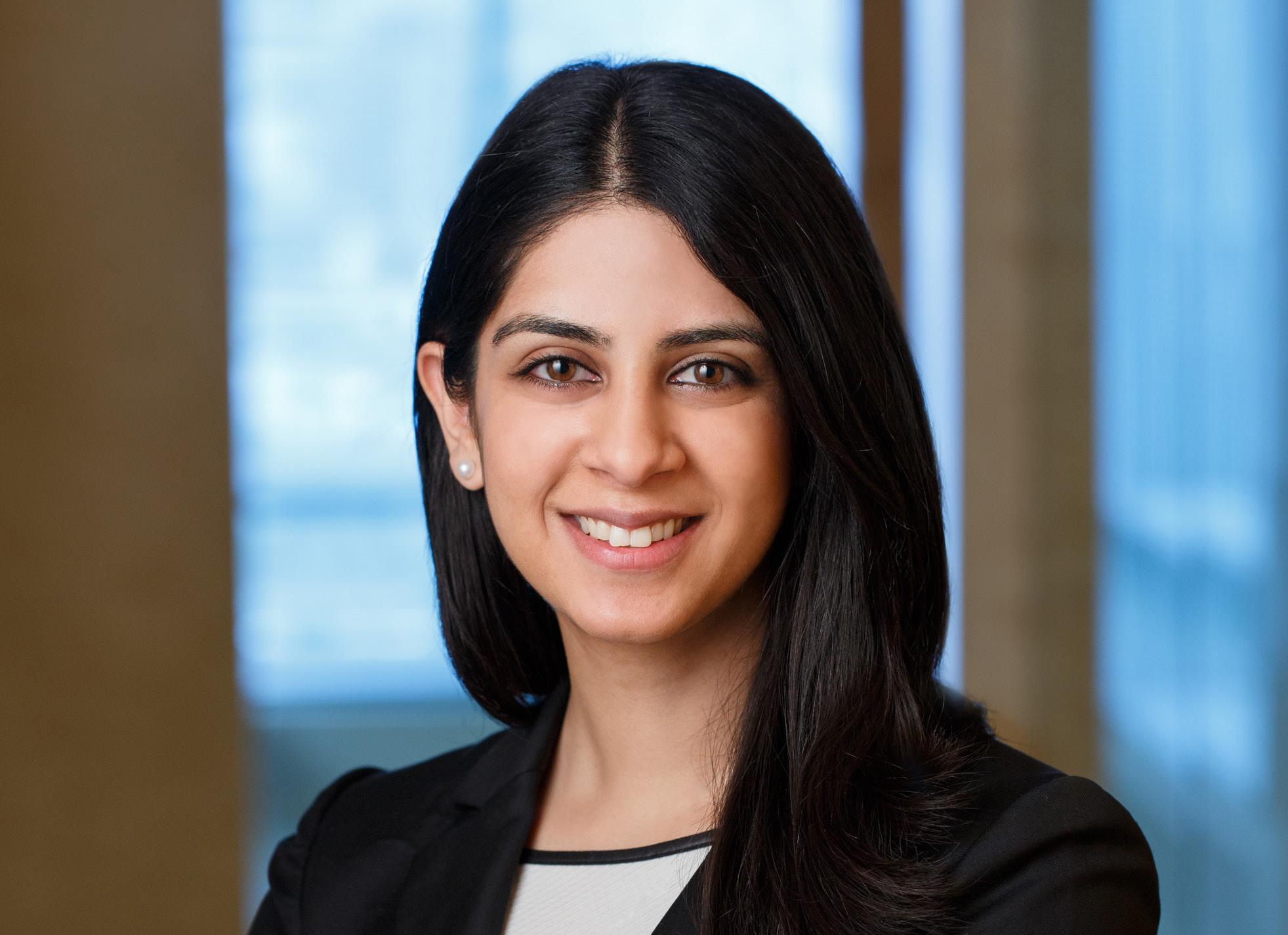
17 minute read
NABILA PIRANI
45 member of Mulgrave’s very first graduating class, the school’s first Head Girl, and now the Alumni A Advisory Board’s first co-Chair, Nabila Pirani has never shied away from paving the way through unchartered territory with leadership and grit. After studying in the United States, earning her Master’s from Columbia University, traveling to India, and pursuing a career in law, Nabila has returned to Vancouver and is now spearheading initiatives to build the Mulgrave alumni community. In this Spotlight, Nabila touches on the path (or lack there-of) she took post-Mulgrave, her tips for students looking to study law, and which Mulgrave teachers influenced her career choice. We hope you enjoy this Alumni Spotlight with Nabila Pirani.
As co-chair of the newly-formed Alumni Advisory Board, you have the responsibility of working with a team to engage and connect the Mulgrave alumni community. What motivated you to want to take on a position like this?
When I moved back to Vancouver, I had already been an alumni liaison for a few years. I knew, however, that I wanted to reconnect with the school in a more substantial way and that I was ready to give back to a community that had given me so much. And so, when the opportunity to be Co-Chair of the newly-formed Alumni Advisory Board presented itself, I jumped.
With over 600 alumni and hundreds of alumni families
and teachers, we’re at such an important stage of alumni community-building, and I’m so excited about the opportunities we have – as an Advisory Board – to lay the foundations for a strong and well-connected alumni community. I think the retention of institutional history (warts and all!) is crucial for any community, and I’m looking forward to sharing my perspective as a member of the first graduating class with those who graduated after me and to learning about their experiences. My hope is that, through reflection and dialogue, we can create an alumni community that is inclusive and welcoming of all the varied experiences that Mulgrave alumni have had over the past thirteen years. Graduating from Mulgrave in 2004, did you know you wanted to study law?
Not at all! Growing up, I was the kid who wanted to be something different every six months. When I was three or four, I told my parents I wanted to be a fisher(wo)man – I then ended up being a vegetarian for about fifteen years, so that didn’t really work out. In high school, I wanted to be everything from an engineer to a cancer researcher to a diplomat. When I graduated from Mulgrave, I knew that I wanted to study political science and maybe be a member of our foreign service - but not much apart from that. Truth be told, career-wise, I was pretty lost. It wasn’t until graduate school and my brief flirtation with academia/public policy that I realised it was through law that my various interests actually came together.
How did you choose your career path?
As one of the many lawyers who studied political science at university before attending law school, some might say that I had a pretty clear path to law. I certainly chose to attend the Faculty of Arts at UBC-Vancouver and chose Political Science as one of my majors, but I graduated from UBC in 2009 and, at that point, law school wasn’t even on my radar.
particular path. Having a path presupposes a teleological purpose to our careers – that there’s a destination that we’re walking towards – and that any step that is off that path is merely an aberration or a detour. To me, this sort of thinking diminishes the many valuable experiences that we have that don’t neatly fit into this idea of a career path. For example, in such a teleological understanding of our careers, at best, my Master’s degree from Columbia and my public policy research fellowship at the Asia Pacific Foundation of Canada (two very valuable experiences without which I wouldn’t be the person I am today) are mere blips on my path from political science major to lawyer.
Maybe this is a result of the various experiences I have had, but I like to think about my career as a series of steps – rather than as a path. To me, there probably is no path and, if one exists, it is always changing. To me, it’s about the next step that you take. And maybe the current step doesn’t flow perfectly from the previous one, but, in my mind, thinking of my career as a series of steps allows me to put all my energies into the current one, and to focus on it rather than being fixated on a destination that may or may not exist.
What advice would you give to students who are interested in The biggest piece of advice that I can give to students interested in pursuing a career in law is: talk to lawyers. That might sound obvious, but I think it’s so important to understand what a career in law is actually like before jumping in. Legal careers vary based on jurisdiction, area of practice, year of call, and whether one practices in a firm or for government, among other factors, and so it’s important to speak with as many lawyers as you can.

(Of course, if any current students or alumni are interested in learning more about a career in law, I’m more than happy to chat.)
You spent a summer in India while working towards your Master’s in Middle Eastern, South Asian, and African Studies
at Columbia University. What brought you to India?
Urdu is one of my favourite languages and, by the time I got to Columbia, I had already studied it for a few years at UBC and was looking forward to taking further classes during graduate school. During my first year at Columbia, I heard about the American Institute of Indian Studies’ Urdu language programme in Lucknow, India, and couldn’t resist the opportunity to study the language further in one of the most important cities for Urdu language and literature. I applied for the programme and, shortly after finishing my first year of graduate school, moved to India for a few months.
Did you find it was a difficult adjustment moving from New York? What did you learn from the experience?
I had been to India previously, spoke a few Indian languages fluently, and had studied the region for a number of years; and so, when I got onto that plane to India, I naively thought I wouldn’t find it difficult at all. In fact, the opposite was true, and I had serious culture shock.
Living in New York, I had this wonderful sense of anonymity wherever I went. I am obviously South Asian and female, some people were able to place my accent as being “Canadian”, but that was often it. In Lucknow, I often found that, as soon as
I said my name, people would place me and my identity into various boxes and, regularly, boxes that I didn’t necessarily identify with. And so, I constantly struggled with being expected to act pursuant to boxes that I had never really
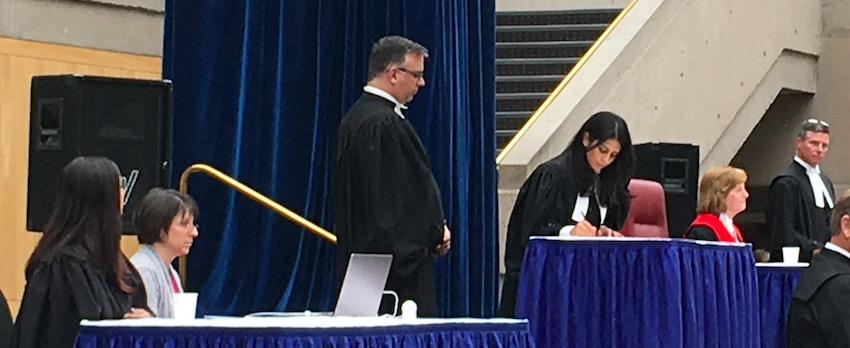
ABOVE: Nabila at the call to the bar.
thought about. Growing up in North America, my South Asian heritage has always been – and continues to be – very important to me, and I went to India thinking that I was quite South Asian. I returned to North America realising just how very Canadian I actually am.
On the more practical side, I learned that eating too many mangoes during mango season is a thing, and that drinking water off the side of the road in a city flooded by monsoons is a really bad idea.
Where are you currently working and what does a typical day look like for you?
I’m an associate lawyer in the banking and debt financing group at Lawson Lundell LLP, here in Vancouver. We represent both borrowers and lenders in a variety of corporate and commercial transactions. There really is no typical day in my world, which is something I really enjoy about the practice of law. On any given day, I’ll do everything from drafting and reviewing documents, to liaising with clients and opposing counsel about ongoing transactions, to researching current law.
What were some of your passions while you were a student at Mulgrave?
Mulgrave was such a small school when I started in Grade 4 that most of us did everything – from participating in all the sports teams to being a part of the annual school play! In Middle School, many of us ran cross country, swam, and played on the basketball and volleyball teams.
Thankfully, by the time we got to high school, we got to ‘specialise’. I had grown up playing tennis, so I played on the badminton team throughout high school. I also sang in the choir and did musical theatre. One of my most memorable experiences is playing Mother Abbess and being stage manager in our production of the Sound of Music in Grade 11. I was also involved in various leadership capacities, first as a member of Student Council and then as Head Student of the first
graduating class.
Did any teachers have a profound influence on you?
Definitely. There are a number of Mulgrave teachers who had a huge impact on me. Ms. Morgan and Mr. Vodrey to name just two. Mr. Hardy, though, is one of the biggest reasons I ended up making the switch from wanting to pursue a career in the sciences to studying political science. Had it not been for his making us read Machiavelli’s The Prince in Grade 10 or 11 and streaming the UN Security Council debates in March 2003, I likely would have never ended up wanting to study poli-sci. Not only did Mr. Hardy make the study of social sciences interesting, he made it important and forced us to think critically and imaginatively about the world around us. Most importantly, he gave us space to find our own voices.
JAMIE LABRON ( ) WOLFF
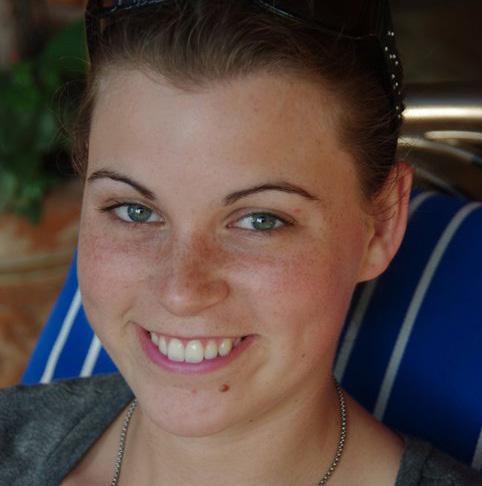
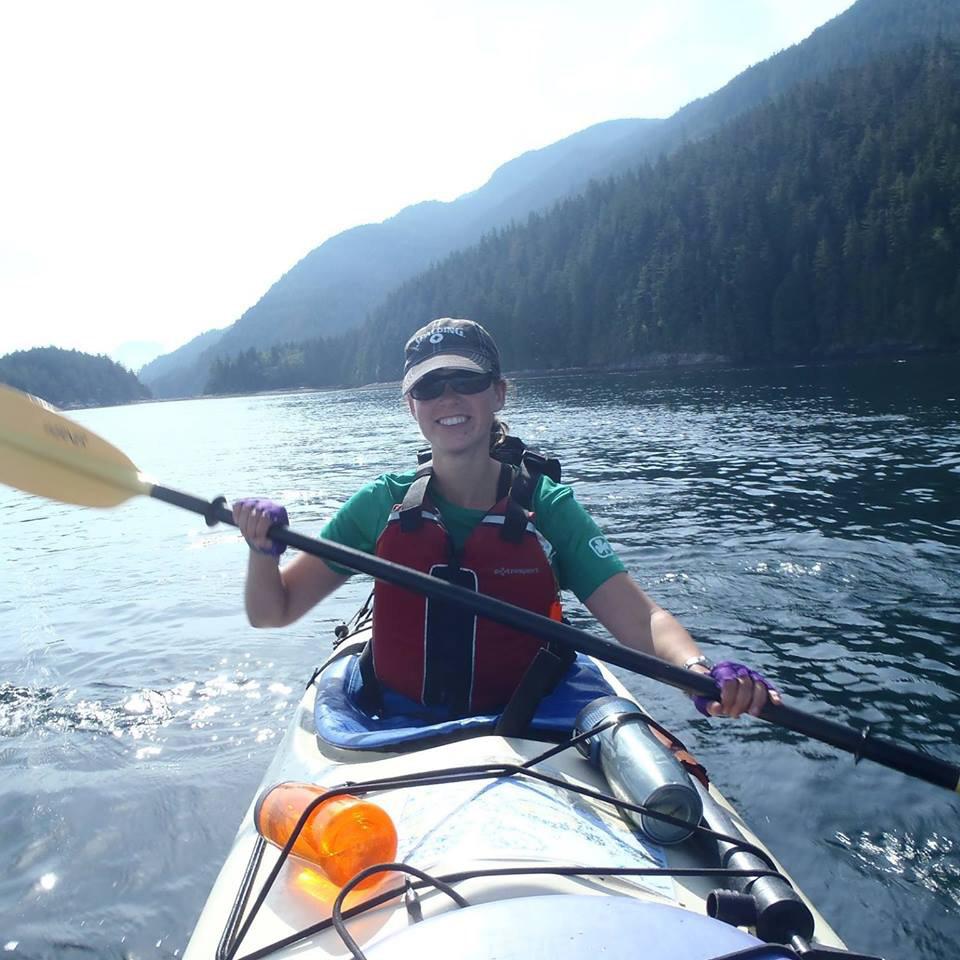
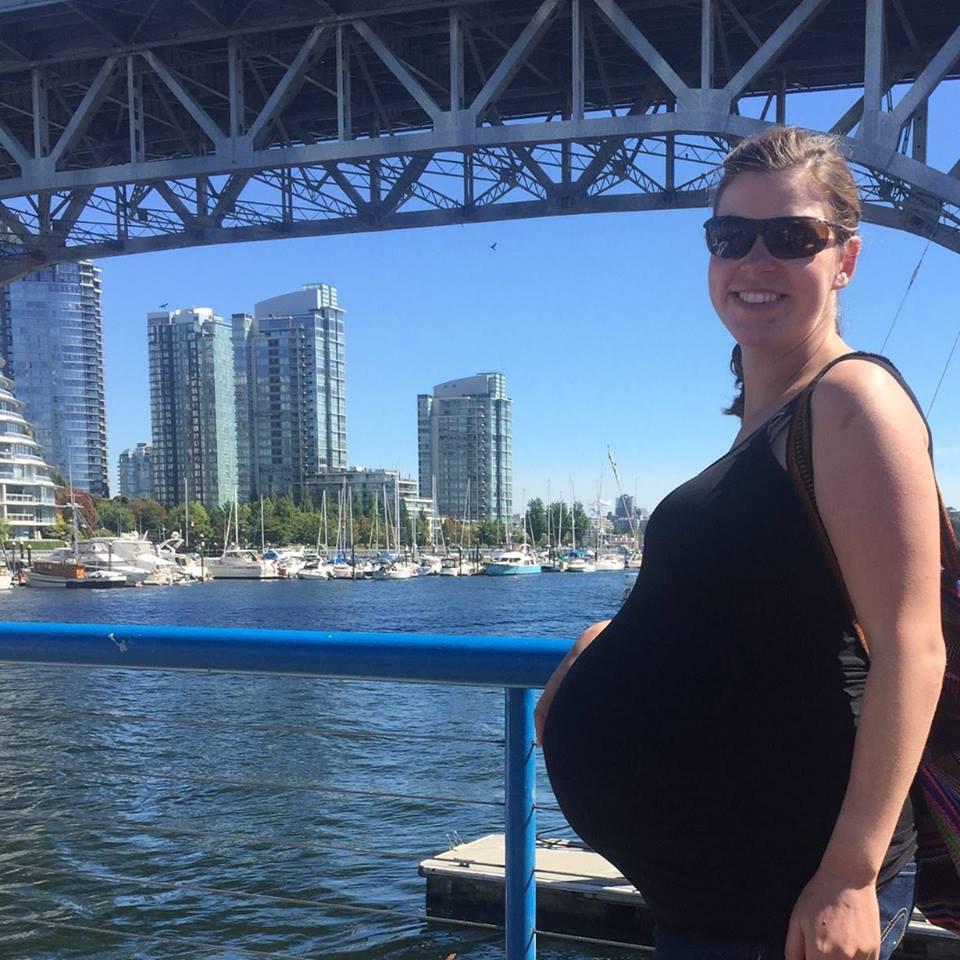
escribed by Mr. Lee Hardy as, “Someone who always received joy from helping others”, Jamie fell D into a career path perfectly suited for her altruistic spirit - an occupational therapist. An adventurer, a career woman, and now a new mother to a beautiful baby girl, Jamie’s combination of tenacity and compassion allows her to thrive in all aspects of her life and truly make a difference in the lives of others.
We were lucky enough to have the opportunity to steal a few minutes of this new mom’s time and interview Jamie during the beginning months of her maternity leave. In this Alumni Spotlight, Jamie shares her experience of earning her Master’s degree, becoming an Occupational Therapist at Surrey Memorial Hospital, and explains what a day in the life of an OT looks like.
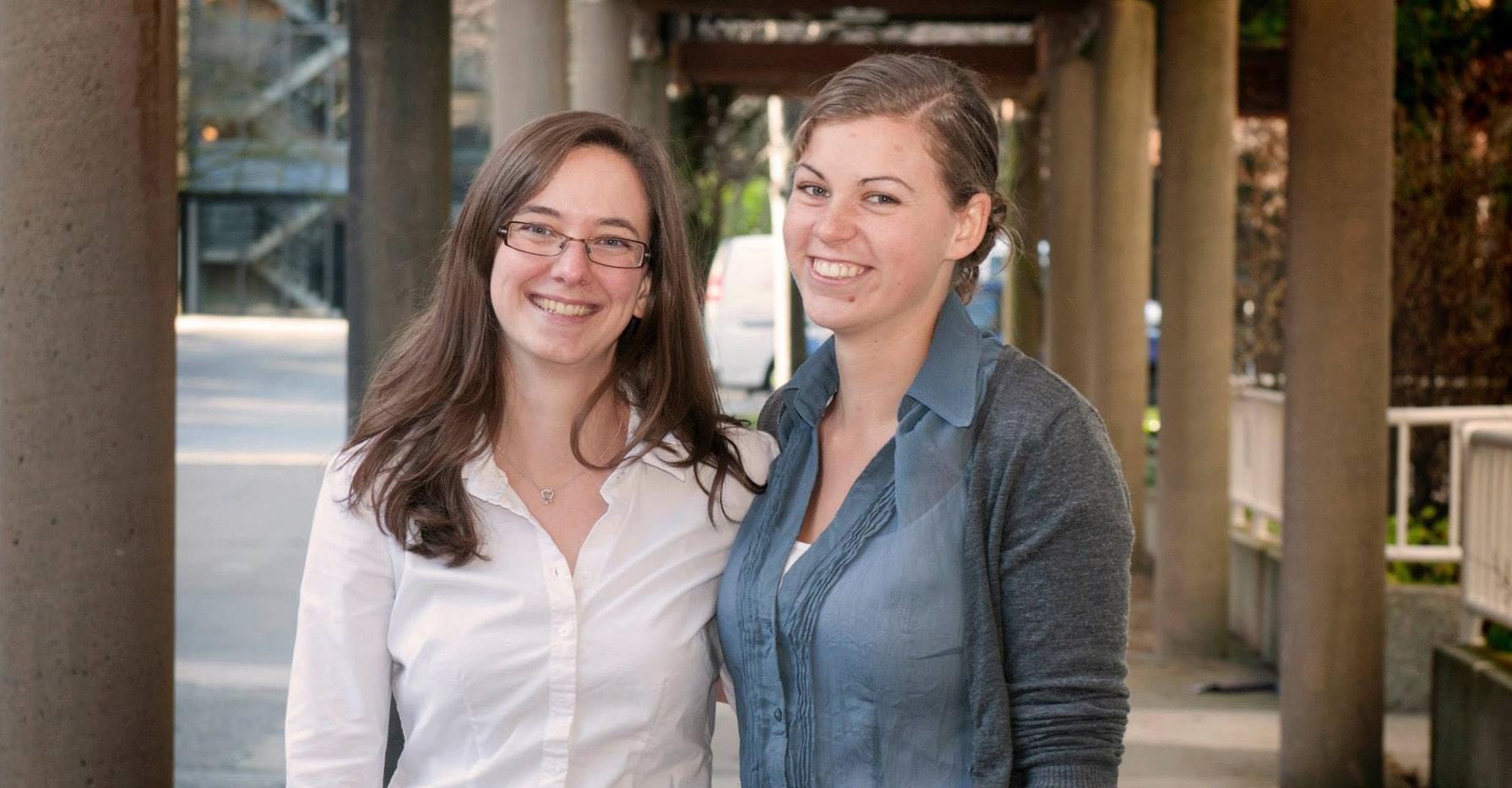
ABOVE: Jamie on her thesis defence day, with co-author Claire Parker.
For those who are unfamiliar, can you explain what an Occupational Therapist is? What specifically do you do?
As an Occupational Therapist (OT), I work with people who have an illness, disability, or other health-related issues that interfere with their ability to do the day-to-day things that are important to them. I work together with my patients to assess their abilities and help determine ways to enable them to continue to do what they need and want to do. Examples of activities people may be having difficulties with can include self-care, such as: getting dressed, eating, or moving around the house; being productive, including going to work or school; and participating in community and leisure activities such as sports, gardening, or social activities.
With my education, I can work with many different populations and in many different practice areas. I know OTs who work in home care, hospitals, schools, private practices, health boards, community mental health centres, clinics, halfway houses, vocational programmes, programme development, rehabilitation companies, and correctional institutions (just to name a few). I’ve had a chance to try working in many of those different places as a student and am currently working in acute care at Surrey Memorial Hospital. In my job at Surrey Memorial, I am the OT for two different wards - a general medical ward specialising in dementia and related neurocognitive diagnoses, and a palliative care ward. Most of what I do is working with people to help determine what they need in order to be able to manage and thrive at home once they are ready to be discharged from the hospital. It involves assessing their abilities, strengths and resources, and degree of disease progression, as well as working together with the patient, their family, and the hospital team to develop a discharge plan. Sometimes this involves specialised equipment such as a wheelchair, hospital bed, or a stove guard that automatically turns off a stove burner if it’s been left on too long. Other times it involves rebuilding skills to be able to go to the bathroom independently or techniques to be able to remember to take medications on time.
There is an amazing amount of variety in what I get to do because everyone has a different way that they normally do things at home, and the tasks that are important to people and their families vary every time. Some of the most rewarding things that I’ve done recently include: creating a specialised wheelchair system for a lady who was in palliative care, so she could leave the hospital comfortably in order to go wedding dress shopping with her daughter, and helping a gentleman who was worried they would have to put his wife with
dementia in a nursing home, come up with a plan to continue to support her at home safely and enable her to continue gardening and going for walks, which is what she loved to do.
This job sounds both incredibly rewarding and very challenging. Mr. Hardy described you as, “Someone who always received joy from helping others”. Did you always know you wanted to be an OT?
When I was at Mulgrave, I knew that I enjoyed working with people and was vaguely interested in either being a teacher, nurse, or doctor. I didn’t even know what OT was until I was
in my second year of undergrad at university. When I learned what it was, I realised this career was a perfect mix of helping others, job variety, flexibility to continue my career while working on other life goals (such as starting a family), and organised creativity (which I really developed through stage managing productions at Mulgrave). I became determined that this was going to be a great fit for me and pulled up my socks (and my grades) to work towards getting into the Master of It does sound like the perfect fit for you! Your work experience prior to working in acute care at Surrey Memorial Hospital was primarily with children and young adults. How did you find the transition into the field of geriatrics?
In the beginning, I was just happy to finally have a job and planned to transition into pediatrics as soon as possible. However, I very quickly realised how amazing it can be to work with seniors. Everyone who I work with has a lifetime of experience, stories, hobbies, and habits, which, once you get to know them a bit better, are an amazing resource when developing a rehab programme. I had to adjust my mindset slightly, and I found the opportunity to be every bit as creative as when I worked with children, perhaps even more so, in figuring out how to make someone’s therapy relevant and meaningful to them. Additionally, by working with people while they are in the hospital, you have the privilege of being able to support not only the patient, but the families as well during a
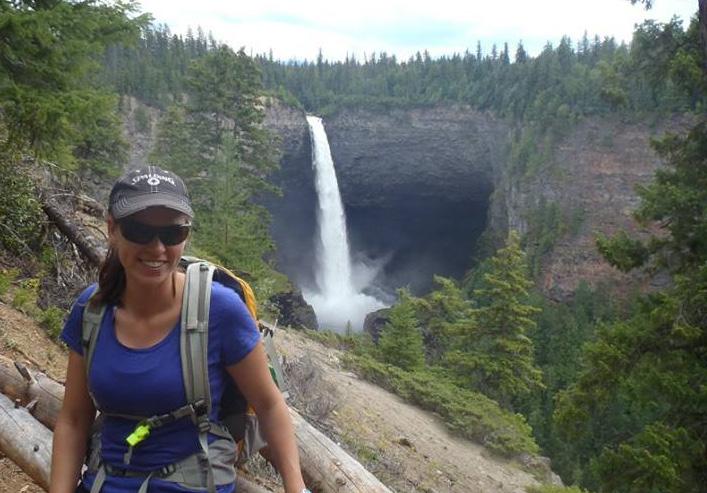
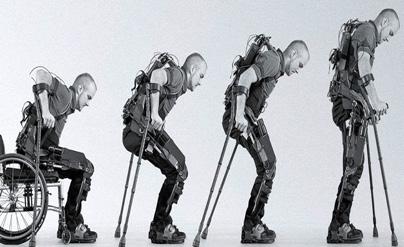
ABOVE: A demonstration of exoskeleton technology, which is what Jamie’s thesis was on.
time of crisis. I find that using this family-centred approach to care actually can be very similar to working in pediatrics, in that while the patient is the centre of your care, you have to consider the people around them too, such as their spouse, children, and caregivers.
While working toward your master’s at UBC, why did you choose to do your thesis topic on Exoskeleton Technology?
Exoskeleton technology is an emerging field with limitless potential, and through my thesis, I was able to work together with engineers and designers to add a health care and potential user perspective to their exoskeleton design. I surveyed these populations, and through the analysis of the data, was able to help the designers by indicating which potential features would be most important to users so they could prioritise their integration. OTs work a lot with clients to figure out which equipment will work best for them, and it also gave me the ability to learn more about the process of how these products are designed.
What advice would you give to students looking to study to become an OT?
My main piece of advice is to learn as much as you can about what OT is and get as much experience as possible working with people with disabilities or mental illness. I had work experience as a personal support worker, lifeguarding with Easter Seals camps, and volunteering at BC Women’s Hospital and GF Strong. My volunteer and work experience was invaluable and helped me with both getting into and getting through the programme. Generally, working in healthcare, it is very challenging to work with people who cannot access the resources they need due to barriers such as finances, transportation, service availability, or wait lists. Knowing that there are services that could help people live longer, fuller, and more independent lives in the community, but that they cannot access them is very challenging. Conversely, working with people who you know may be able to get better if they participated in therapy but choose not to is also very challenging.
Having accomplished so much at such a young age, what would you say you’re most proud of achieving in your career so far?
Graduating with my master’s degree! The OT programme itself was very difficult, and being able to get through it, including publishing my thesis, was a huge accomplishment for me.
Most influential teacher at Mulgrave?
Ms. Morgan was extremely influential for me, as I know she was for many other of my classmates. In Grade 9, she was my English teacher, and I was very upfront about the fact that I hated writing and was not very good at it. Needless to say, she did not let me get away with that and really encouraged using my creativity to find an approach to writing that worked for me. I was able to use many of the tools she gave me to complete all of the writing components of my degrees, in addition to the many hours I spend charting my patients’ progress at work.
Caring for patients with dementia can, I’m sure, be challenging at times. What techniques or tools do you use to stay positive and focussed?
It certainly can be, and often the most difficult element is getting people to trust you enough to let you work with them. I find that taking the time to get to know my patients and what matters to them at the beginning of every patient encounter is crucial to a more positive working relationship and staying more positive myself. Additionally, I really try to enjoy the moments of success that you do have, no matter how small, and encourage the patients and families that I work with to do the same.





